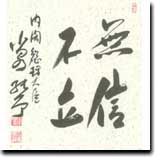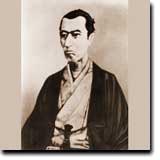![]()

|
Favorite maxims
One of Prime Minister Koizumi's favorite maxims is "If the people have no faith in their leaders, they cannot stand. " These words are from an anecdote in the Analects of Confucius. Zigong (Tzu-kung) asked Confucius about government. Confucius said, "The requisities of government are that there be sufficient food, sufficient military equipment, and the confidence of the people in their leaders." If you had to give up one of the three, Zigong asked, which should it be? "Give up military equipment," Confucius replied. And if you had to dispense with one of the other two? "Give up food," said Confucius. "Death has always been with us, but if the people have no faith in their leaders, they cannot stand." The Prime Minister is also fond of a maxim from Genshi shiroku, a collection of essays by the Confucian scholar Issai Sato (1772-1859): "One who studies in youth will accomplish things in maturity. One who studies in maturity will not become feeble in old age. One who studies in old age will not decay with death." |

|
Respected figures
The historical figures Prime Minister Koizumi respects most highly include the scholar and patriot Shoin Yoshida (1830-59) and the British stateman Winston Churchill (1874-1965). He respects Yoshida for the courage with which he stuck to his convictions in a time of great turbulence, for his selflessness, and for his brilliance as an educator, producing Shinsaku Takasugi (1839-67) and many other young men who were instrumental in bringing about the Meiji Restoration of 1868 that launched Japan into the modern age. And he respects Churchill for the indomitable spirit with which he fought Adolf Hitler's Nazi regime. The Prime Minister also respects the patriots Shinsaku Takasugi, who led an imperial loyalist militia called the Kiheitai, and Ryoma Sakamoto (1836-67), who was instrumental in the formation of the alliance of the Satsuma and Chosyu domains. Both men died young. Another hero is Nobunaga Oda (1534-82), who was instrumental in unifying Japan after a century of strife among rival warlords. All were men who faced crisis with courage and pioneered a new age with an indomitable spirit. |

|
The spirit of "kome hyappyo" (one
hundred sacks of rice) The domain of Nagaoka was impoverished in the Boshin Civil War of 1868-69 at the time of the Meiji Restoration. In 1870 the domain of Mineyama sent a hundred sacks of rice to Nagaoka as assistance. Most of the domain officials wanted to distribute the rice immediately, but the grand councilor, Torasaburo Kobayashi (1828-77), decided to sell the rice and use the proceeds to build a school instead. His reasoning was that if the rice were simply distributed it would be gone in only a few days, but if it were used to educate people, in future they would be able to generate wealth worth tens of thousands of sacks of rice. Prime Minister Koizumi maintains that the spirit of the hundred sacks of rice -- the willingness to endure pain today for the sake of a better tomorrow -- is what is needed in today's Japan. |